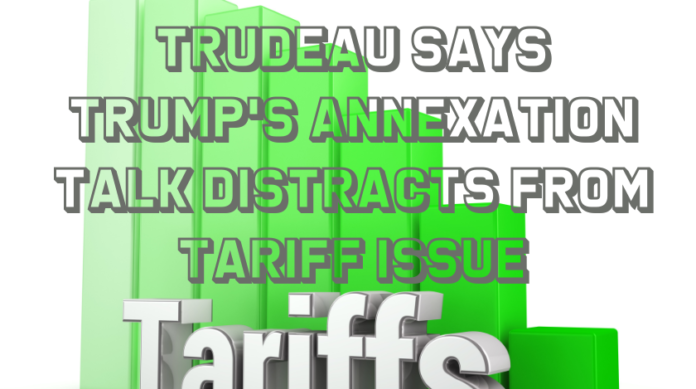In recent months, political tensions between Canada and the United States have escalated, primarily due to U.S. President Donald Trump’s proposed tariffs on Canadian goods trudeau says trump’s annexation talk distracts from tariff issue. Amidst these economic discussions, President Trump introduced the notion of annexing Canada, suggesting it become the 51st state of the United States. Canadian Prime Minister Justin Trudeau has dismissed this annexation talk as a mere distraction from the more pressing issue of impending tariffs. This article delves into the intricacies of this political maneuvering, the potential economic implications of the proposed tariffs, and the broader impact on U.S.-Canada relations.Reuters Anadolu Ajansı
The Emergence of Annexation Discourse
The concept of annexing Canada is not new in political satire or fringe discussions, but its introduction into mainstream political dialogue by a sitting U.S. president is unprecedented. President Trump’s suggestion that Canada could become the 51st state has been met with widespread skepticism and criticism. Many analysts view this proposal as a strategic diversion from the tangible economic policies being considered, particularly the imposition of a 25% tariff on Canadian imports says trump’s annexation talk distracts from tariff issue.
Prime Minister Trudeau has been vocal in his criticism of this annexation rhetoric. He argues that such discussions are intended to shift public attention away from the detrimental effects that the proposed tariffs would have on both Canadian and American economies. In a statement, Trudeau that the annexation talk is a tactic designed to distract from the real issues at hand, particularly the economic consequences of the tariffs. Reuters
The Impending Tariffs: Economic Ramifications
The Trump administration’s proposal to impose a 25% tariff on Canadian goods has sparked significant concern among economists and business leaders. Canada and the United States share a deeply integrated economic relationship, with bilateral trade amounting to billions of dollars annually. The introduction of such substantial tariffs could disrupt supply chains, increase consumer prices, and strain diplomatic relations.
Canadian exports targeted by these tariffs include essential commodities such as steel, aluminum, and agricultural products. The increased costs of these goods would likely be passed on to American consumers, leading to higher prices for everyday items. Moreover, American industries that rely on Canadian raw materials could face increased production costs, potentially resulting in job losses and decreased competitiveness in global markets.
Trudeau has highlighted these potential repercussions, urging U.S. consumers to consider the harm that the tariffs could inflict on their own economy. He pointed out that essential goods like steel, aluminum, electricity, and oil would become more expensive, thereby increasing the cost of living for American families. AP News
Public and Political Reactions
The annexation narrative has elicited a spectrum of reactions from both the public and political figures. In Canada, the proposal has been met with a mixture of disbelief and indignation. Political leaders across the spectrum have united in rejecting the notion, emphaszing Canada’s sovereignty and the absurdity of the suggestion. The Canadian populace has also expressed strong opposition, with many viewing the proposal as an affront to national identity.
In the United States, reactions have been more varied. Some view the annexation talk as a humorous distraction, while others perceive it as a serious policy consideration. Critics argue that such rhetoric undermines diplomatic relations with a key ally and distracts from pressing economic issues. Supporters, however, see it as a bold move that could potentially benefit the U.S. economy by integrating Canada’s resources and markets.
Historical Context of Annexation Proposals
The idea of annexing Canada has surfaced intermittently throughout history, often as a speculative concept rather than a serious policy proposal. In the 19th century, during the era of Manifest Destiny, some American expansionists entertained the notion of incorporating Canadian territories. However, these ideas never materialzed into concrete actions, largely due to Canada’s strong ties to the British Empire and the development of its own national identity.
In contemporary times, annexation discussions have been relegated to academic debates and fictional narratives. President Trump’s revival of this concept marks a significant departure from traditional diplomatic discourse, bringing a historically fringe idea into the realm of mainstream politics.
Strategic Distraction or Genuine Proposal?
Analysts are divided on whether President Trump’s annexation talk is a calculated distraction or a genuine policy consideration. Some argue that it serves as a strategic diversion to shift public focus away from the unpopular tariff proposals and their potential negative impact on the U.S. economy. By introducing a sensational topic, the administration could be attempting to redirect media coverage and public discourse.
Others believe that the annexation proposal reflects a broader geopolitical strategy aimed at consolidating resources and expanding territory. This perspective suggests that the administration is exploring unconventional methods to bolster the U.S. economy and global standing. However, the feasibility and legality of such a move remain highly questionable, given international laws and the principle of national sovereignty.
Canada’s Response and Diplomatic Measures
In response to the annexation rhetoric and tariff threats, Canada has adopted a firm stance to protect its economic and political interests. Prime Minister Trudeau has engaged in diplomatic efforts to convey the potential repercussions of the tariffs to American stakeholders. He has emphsized that the proposed tariffs would harm both economies and has called for a rational approach to trade negotiations.YouTube
Canada has also explored retaliatory measures, considering imposing duties on American products such as orange juice and steel. These counter-tariffs aim to pressure the U.S. administration to reconsider its stance by highlighting the mutual harm that a trade war could inflict. Additionally, Canada has sought to strengthen trade relations with other international partners to mitigate potential losses from reduced trade with the United States.AP News
Potential Impact on U.S.-Canada Relations
The current tensions pose a significant challenge to the historically strong relationship between the United States and Canada. Economic interdependence has been a cornerstone of this bilateral relationship, with both nations benefiting from free trade agreements and collaborative ventures. The introduction of tariffs and annexation rhetoric threatens to erode this foundation,


